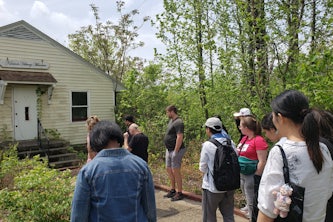Fail Better: Andrew Bass
Computer science and design student suffered from impostor syndrome until he found his niche
Develop an open-source nuclear detection system.
That was the charge from the U.S. Department of Defense to members of its new internship program, the X-Force Fellowship.
Washington University in St. Louis sophomore Andrew Bass, to his surprise, had been selected to serve in the pilot cohort and arrived at Cape Canaveral in Florida for the three-month program convinced he would fail.
“They wanted a detection system that could fit in a briefcase, like what you would see in the movies,” recalled Bass, who is studying computer science at the McKelvey School of Engineering and design at the Sam Fox School of Design & Visual Arts. “I was like, ‘What does that even mean? Why am I even here?’”
For those first weeks, Bass felt lost. At night, Bass studied the concepts that his teammates — all recent college graduates or graduate students — had discussed during the day. Always a strong student, Bass soon discovered he also was his own best teacher.
But even more importantly, Bass realized he should worry less about what he did not know and focus more on what he did, which, in this case, was sensor technology.
“I was able to find my value by specializing in one area that I knew better than anyone else,” Bass said.
The federal agency’s National Security Innovation Network launched the X-Force Fellowship last year to see if students, in partnership with experienced military leaders, could bring fresh approaches to real-world problems. The answer was a definitive yes — and not just because Bass’ team, after several setbacks, developed a functional prototype.
“We were proud of what we delivered, but the main priority was to see if we could come together and create new ideas,” Bass said. “I used to think that you go to college to learn and you bring all that you need to know to industry. Now I see that the underlying concepts behind innovative technologies and ideas are not yet known. Without an instruction manual, you have to learn to teach yourself and lean on each other.”



